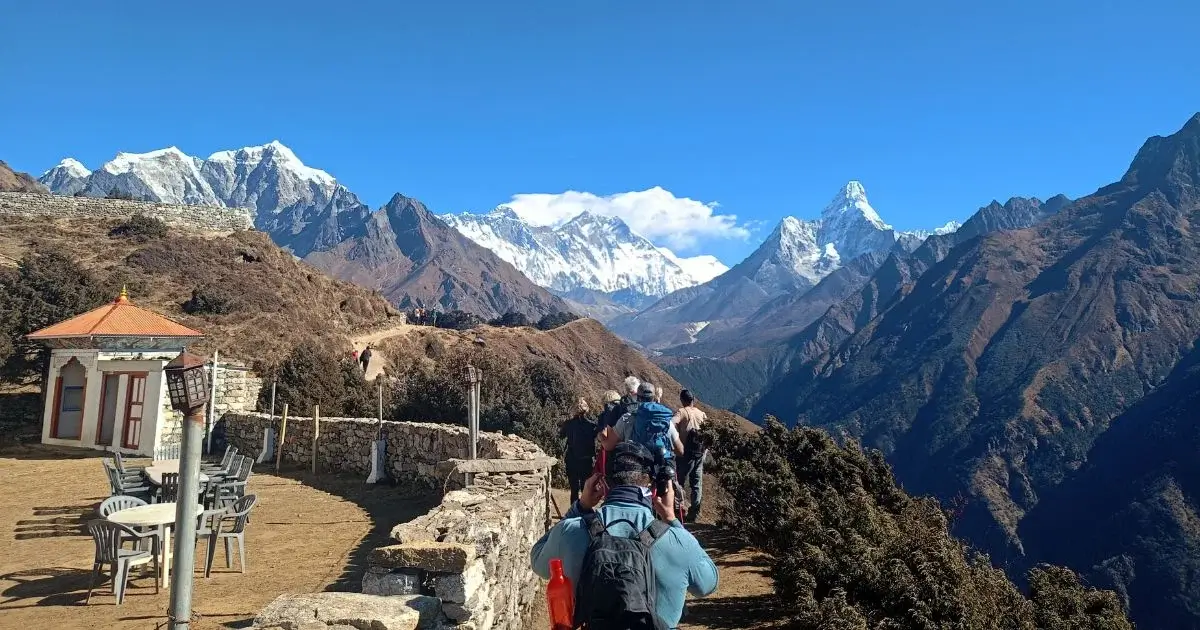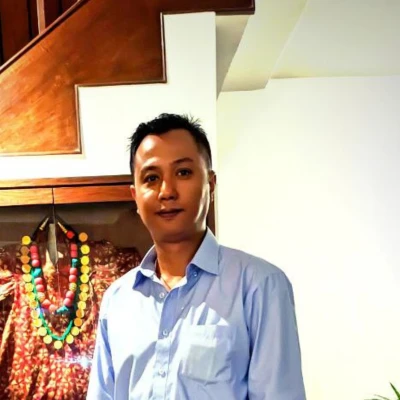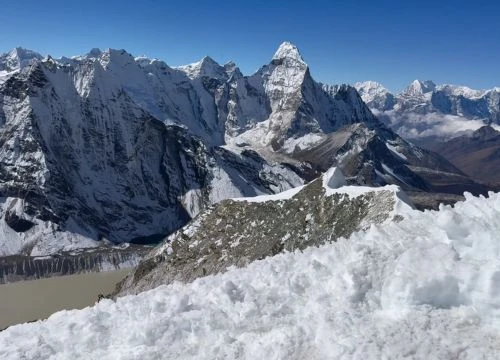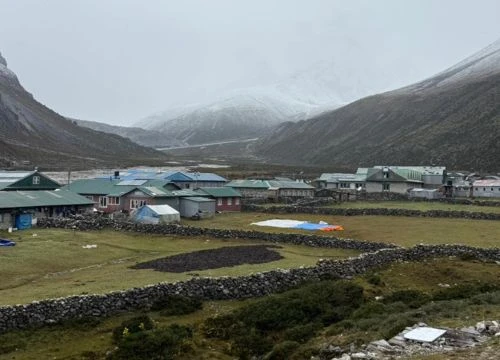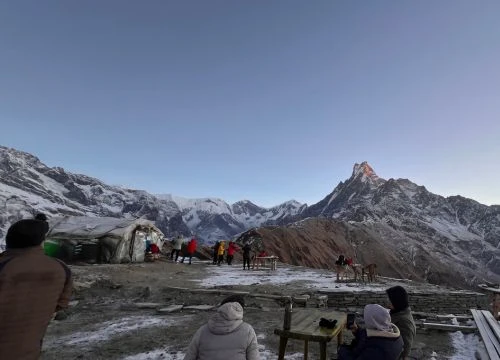Understanding EBC Trek Cost Variations
The cost of EBC trekking depends on numerous factors that can double or even triple your total investment. Many first-time trekkers underestimate the true expense, often focusing only on basic packages without considering additional costs that accumulate along the Everest Base Camp trek route. Notably, the EBC trek is considered one of the world’s most iconic adventures, and understanding these costs ensures a well-planned experience.
Seasonal Price Fluctuations and Peak Season Impact
Trek costs fluctuate significantly throughout the year, with peak seasons commanding premium prices across all services. Specifically, the best season to trek creates the highest demand, thereby driving up costs for flights, accommodation, and guide services in the Khumbu region.
Peak Season Pricing (October-November, March-May)
During these months, Lukla from Kathmandu flight costs increase by 30-40% due to high demand and limited aircraft capacity. Moreover, weather conditions remain optimal for views of Mount Everest, the world’s highest mountain, and surrounding peaks, thus making these periods worth the additional cost for many trekkers. Consequently, accommodation in Namche Bazaar and other popular stops becomes scarce, with teahouse owners charging premium rates.
Shoulder Season Opportunities (Late November, Early March)
In contrast, these periods offer moderate pricing with acceptable weather conditions. However, temperatures drop significantly at higher altitudes, requiring additional gear and preparation for cold conditions on the trail.
Off-Season Considerations (December-February, June-August)
On the other hand, winter months provide the lowest trek costs but present extreme cold and potential flight cancellations. Similarly, monsoon season makes trekking dangerous due to landslides and poor visibility, with most operators suspending services entirely.

Group Size Impact on Individual Costs
Furthermore, the structure of your trekking group directly affects per-person expenses. Therefore, understanding these dynamics helps optimise your budget for the days of the EBC trek.
Group Size | Cost Impact | Advantages | Disadvantages |
Solo Trekker | +40-60% premium | Maximum flexibility | Higher costs, less social |
2-3 People | +20-30% above group rates | Personal attention | Moderate cost increase |
4-6 People | Optimal cost efficiency | Balanced cost/flexibility | Group coordination needed |
8-15 People | Lowest per-person cost | Maximum savings | Less flexibility |
Essential Cost Breakdown by Category
International Travel and Domestic Flight Expenses
Transportation represents a major portion of your total Everest Base Camp trek cost, with international flights and the crucial Kathmandu-to-Lukla flight forming the foundation of your travel budget.
Route | Cost Range | Best Booking Time |
North America to Kathmandu | $900-1,600 | 2-3 months advance |
Europe to Kathmandu | $650-1,300 | 2-3 months advance |
Australia/New Zealand | $1,000-1,700 | 2-3 months advance |
Asia-Pacific | $400-900 | 4-6 weeks advance |
Middle East | $500-1,100 | 4-6 weeks advance |
Kathmandu to Lukla Flight Details
Specifically, the Lukla flight represents both a significant expense and a potential logistical challenge. For example, this 35-minute flight carries you from the airport in Kathmandu to Lukla Airport, where the EBC trek typically begins your journey towards the base camp.
Flight Details | Cost |
One-way fare | $180-220 |
Return journey | $360-440 |
Peak season surcharge | $50-80 additional |
Weather delay contingency | Budget 1-3 extra nights |
Essential Permits and Government Fees
Moreover, all trekkers entering the Khumbu region must obtain specific permits for the EBC, including the Sagarmatha National Park permit. These costs remain fixed regardless of your trek style or the duration of your trek.
Permit Type | Cost | Processing Time |
Sagarmatha National Park Permit | $30 | 1-2 hours |
Khumbu Pasang Lhamu Rural Municipality | $20 | 1-2 hours |
TIMS Card | $20 | 1-2 hours |
Total Permit Costs | $70 | Half day |
Professional Guide and Porter Services
Additionally, the decision to hire guide and porter services significantly impacts both your EBC trek cost and overall experience. In fact, most trekkers find these services essential for safety, cultural understanding, and physical comfort as they make the trek to EBC.
Service Type | Daily Rate | Additional Costs |
Experienced Guide | $28-38 | $18-25 (meals/accommodation) |
Local Guide | $22-28 | $15-20 (meals/accommodation) |
Porter Service | $18-25 | $15-20 (meals/accommodation) |
Sherpa Porter | $25-32 | $18-25 (meals/accommodation) |
Special Language Guide | $45-65 | $18-25 (meals/accommodation) |
What's Included in Guide Services:
Route navigation and safety oversight
Cultural interpretation and language assistance
Weather condition assessment
Altitude sickness recognition and response
Emergency communication and Everest link coordination
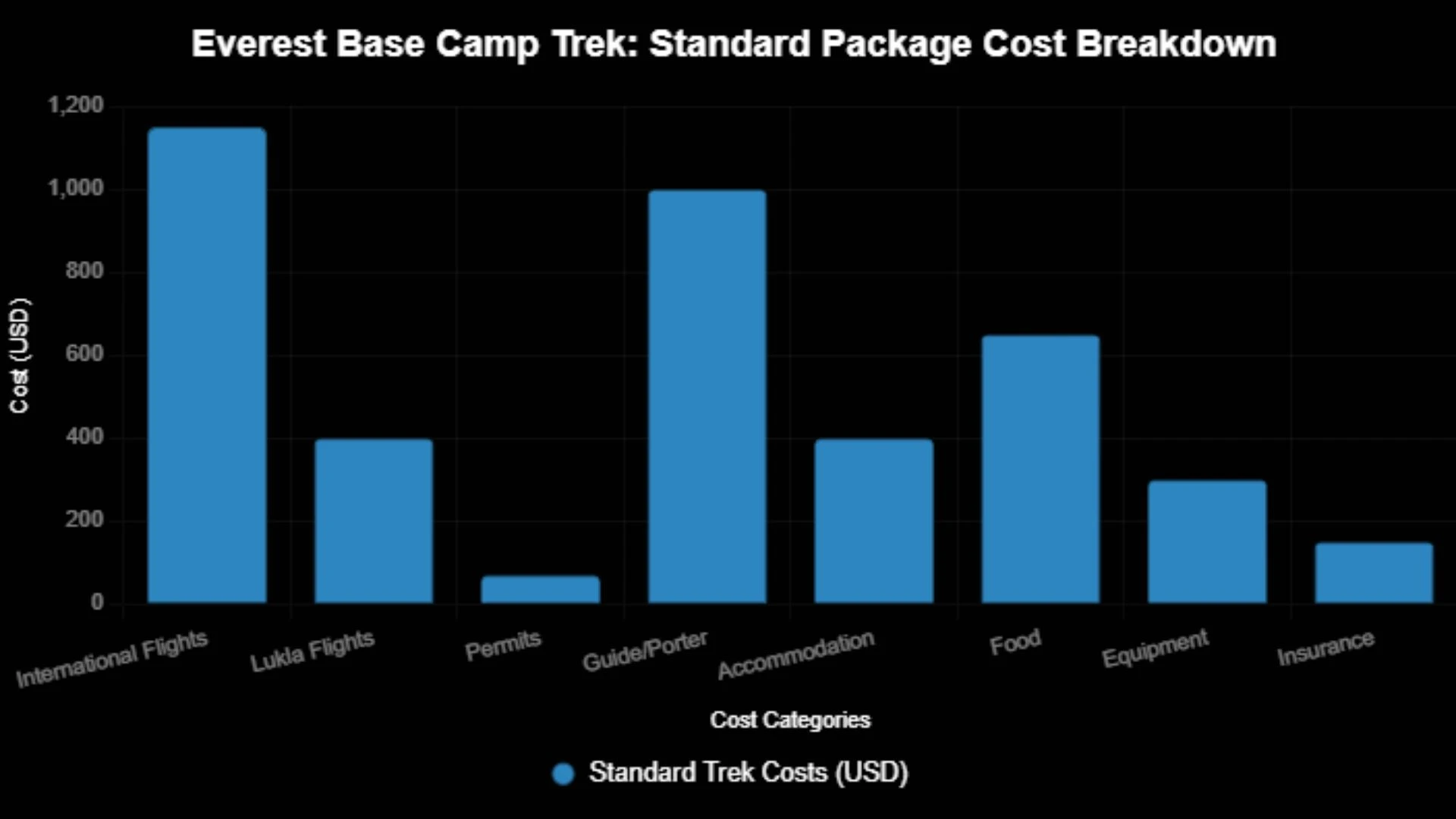
Alt text: Bar Chart for Cost Breakdown by Category
Accommodation Costs Throughout the Trek Route
Furthermore, teahouse accommodation forms the backbone of EBC trek infrastructure. Thus, understanding accommodation costs at different elevations helps budget accurately for the entire length of the trek from Lukla to EBC and back to Kathmandu, where a comfortable hotel in Kathmandu awaits pre- and post-trek.
Location/Elevation | Basic Rooms | Private Rooms | Hot Shower |
Kathmandu (Pre/Post trek) | $12-25 | $35-60 | Included |
Lukla to Namche (2,800-3,440m) | $8-15 | $15-25 | $4-8 |
Namche to Tengboche (3,440-3,870m) | $15-25 | $25-35 | $5-10 |
Dingboche to Gorakshep (4,400-5,140m) | $20-35 | $35-50 | $8-15 |
Comprehensive Food and Beverage Expenses
Moreover, meal costs increase substantially with altitude due to transportation challenges and limited local food production. Therefore, understanding food pricing helps budget accurately for your daily nutrition needs along the Everest Base Camp trek route.
Elevation Range | Breakfast | Lunch | Dinner | Hot Drinks |
Lower (2,800-3,440m) | $4-8 | $6-12 | $8-15 | $2-4 |
Mid (3,440-4,400m) | $6-10 | $8-15 | $10-18 | $3-5 |
High (4,400m+) | $8-15 | $12-20 | $15-25 | $4-8 |
Popular Menu Items and Costs:
Dal Bhat (traditional Nepali meal): $8-15 (best value with refills)
Fried rice/noodles: $10-18
Western breakfast: $8-15
Pizza: $12-20
Bottled water: $1-8 (increases with altitude)
Essential Equipment and Gear Requirements
Additionally, proper equipment ensures safety and comfort during your high-altitude Everest trek. For example, your packing list for EBC can include purchased, rented, or home-brought gear, each affecting your overall costs differently.
Equipment Category | Purchase Cost | Rental Cost (per day) |
Down Jacket | $150-400 | $2-4 |
Sleeping Bag (-15°C) | $200-500 | $2-3 |
Trekking Boots | $150-350 | $2-4 |
Trekking Poles | $50-150 | $1-2 |
Daypack | $80-200 | — |
Headlamp | $30-80 | — |
Essential Packing Checklist:
Base layers (merino wool recommended)
Insulating layers (fleece or down)
Outer shell jacket and pants
Warm hat and sun hat
Insulated gloves and liner gloves
Wool socks and liner socks
Quality trekking boots
Gaiters for snow protection
Sunglasses (glacier-rated)
Comprehensive Travel Insurance Coverage
Importantly, travel insurance covering high-altitude trekking represents a crucial expense that many trekkers underestimate. Specifically, standard travel insurance often excludes coverage above 3,000-4,000 metres, critical for trekking to the base camp of Everest.
Coverage Type | Minimum Amount | Typical Cost |
Medical Expenses | $100,000 | $80-200 |
Emergency Evacuation | $500,000 | Included |
Trip Cancellation | 100% of trip costs | $30-80 additional |
Personal Effects | $2,000-5,000 | $20-50 additional |
Budget vs Standard vs Luxury Options
Budget Trek Option: $1,400-2,200 Total Cost
Budget trekking attracts cost-conscious travellers willing to accept basic conditions to get to EBC (14 days), with costs around $1,400-2,200.
Cost Category | Amount |
International Flights | $800-1,200 |
Lukla Flights | $480 |
Permits | $70 |
Guide/Porter | $500-700 |
Accommodation | $150-250 |
Food | $300-500 |
Equipment Rental | $100-200 |
Insurance | $80-150 |
Total Budget Range | $1,400-2,200 |
Budget Trek Features:
Economy international flights
Basic teahouse accommodation (shared rooms)
Simple meals (primarily dal bhat)
Local guide services
Essential Sagarmatha National Park permit
Basic equipment rental
Standard Trek Package: $2,800-4,200 Total Cost
In contrast, standard packages represent the most popular choice, balancing cost with comfort and safety features that enhance the overall experience, with costs around $2,800-4,200.
Cost Category | Amount |
International Flights | $900-1,400 |
Lukla Flights | $360-440 |
Permits | $70 |
Guide/Porter | $800-1,200 |
Accommodation | $300-500 |
Food | $500-800 |
Equipment | $200-400 |
Insurance | $100-200 |
Pre/Post Trek Services | $200-400 |
Total Standard Range | $2,800-4,200 |
Standard Package Features:
Reliable international flight options
Private tea house rooms where available
Varied meal selections
Experienced guide and porter services
Quality equipment rental included
Airport transfers and logistics support
Everest Base Camp Luxury Trek: $6,000-12,000 Total Cost
On the other hand, luxury packages eliminate most physical discomforts and logistical concerns through premium services and enhanced safety measures, ensuring a trip to EBC is one of unparalleled comfort.
Cost Category | Amount |
Premium Flights | $1,500-2,500 |
Helicopter Options | $1,000-2,000 |
Permits | $70 |
Guide Team | $1,500-2,500 |
Premium Accommodation | $800-1,500 |
Enhanced Meals | $800-1,200 |
Premium Equipment | $500-1,000 |
Insurance Plus | $200-400 |
Luxury Services | $1,000-2,000 |
Total Luxury Range | $6,000-12,000 |
Luxury Trek Features:
Business class or premium flights
Helicopter transport options
Best available accommodation
Professional guide team
Premium equipment provided
Satellite communication devices
Medical support availability
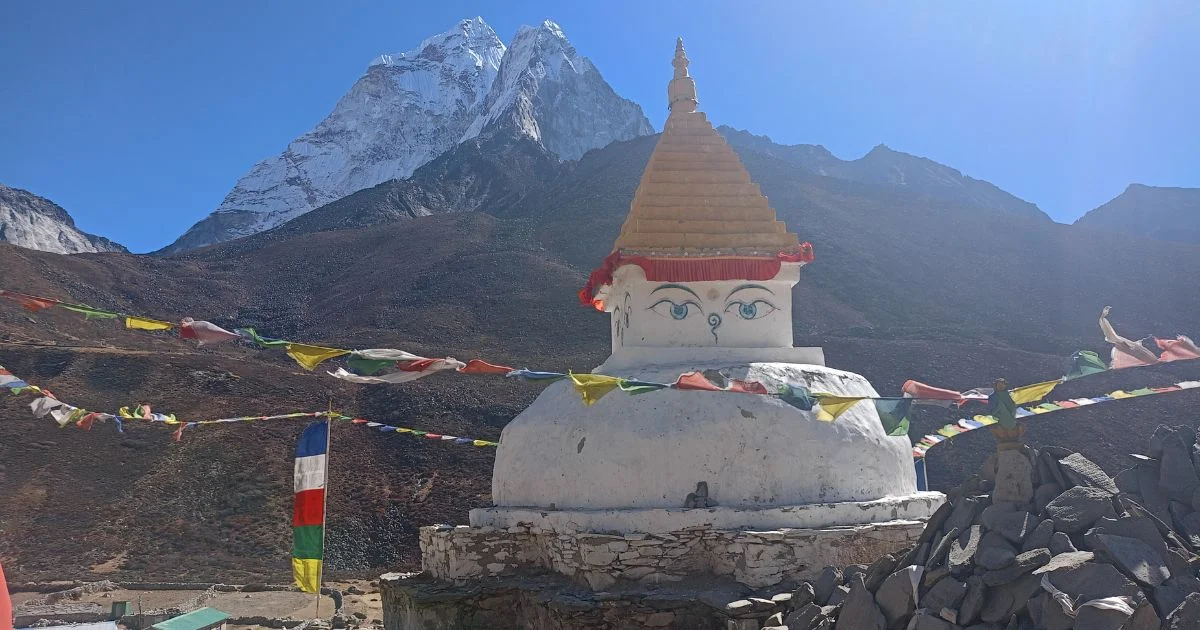
Hidden and Unexpected Costs
Many trekkers underestimate additional expenses that commonly arise during treks like Sagarmatha Camp. Thus, planning for these costs prevents budget surprises during your journey.
Weather Delay Contingencies
For instance, Lukla flight cancellations due to weather conditions represent the most common unexpected expense. In one trek I guided in 2023, a three-day delay forced clients to budget for extra hotel nights and meals, eventually opting for a $600 helicopter to return back to Kathmandu.
Scenario | Additional Cost |
1-2 day delay | $100-200 |
3-5 day delay | $300-500 |
Extended delay (6+ days) | $500-1,000 |
Helicopter alternative | $400-600 per person |
Emergency and Medical Expenses
Moreover, high-altitude trekking presents unique health challenges that can significantly impact your overall cost of trekking to the Sagarmatha base.
Emergency Type | Cost Range |
Helicopter evacuation | $8,000-15,000 |
Medical treatment in Kathmandu | $200-2,000 |
Emergency oxygen | $100-300 |
Additional recovery days | $50-100 per day |
Tipping and Gratuity Expectations
Additionally, tipping represents a significant cultural expectation and additional cost for guide and porter services, an important part of the trek.
Service Provider | Recommended Tip |
Guide | $15-20 per day |
Porter | $7-10 per day |
Group tip pool | $300-450 total |
Strategic Cost Reduction Techniques
Smart planning and informed choices can significantly reduce your EBC trek costs without compromising safety or experience quality.
Direct Booking Benefits
For example, booking directly with Nepal Everest Base Camp Co. saves 15-20%, as seen with a Canadian group in 2022 who saved $600 each by avoiding international agencies.
Booking Method | Cost Impact | Advantages |
International Agency | Baseline cost | Convenience, support |
Direct Nepal Operator | 15-25% savings | Local expertise, better rates |
Group Formation | 20-40% savings | Shared costs, social experience |
Optimal Timing Strategies
Season | Cost Impact | Weather Conditions |
Peak Season | Baseline | Optimal visibility |
Shoulder Season | 15-25% savings | Good conditions |
Off Season | 30-50% savings | Challenging conditions |
Equipment Strategy
Approach | Best For | Cost Impact |
Rent Everything | Single trek | Lower upfront cost |
Buy Basics, Rent Specialty | Future outdoor activities | Balanced approach |
Purchase All | Multiple adventures | Higher initial, lower long-term |
Currency and Payment Considerations
Furthermore, understanding payment methods and currency exchange helps optimise your trek costs and avoid unnecessary fees.
Currency Requirements
Currency | Amount Needed | Usage |
USD Cash | $800-1,200 | Major expenses, permits |
Nepalese Rupees | $300-500 | Daily expenses, tips |
Credit Cards | Backup only | Limited acceptance |
Exchange Rates and Banking
Service | Cost | Availability |
Kathmandu ATMs | $3-7 per transaction | Widely available |
Money Exchange | 0% commission | Competitive rates |
Namche ATM | $5-10 per transaction | Single location |
Credit Card Processing | 3-5% fee | Limited locations |
Sample Complete Trek Budgets
Sarah's Budget Trek Experience - $1,850 Total
Sarah, an experienced backpacker from Germany, travelled in shoulder season to complete the EBC trek.
Expense Category | Amount |
Sydney-Kathmandu flights | $1,100 |
Lukla flights | $380 |
Permits | $70 |
Local guide (12 days) | $420 |
Basic accommodation | $180 |
Simple meals | $360 |
Equipment rental | $120 |
Insurance | $85 |
Miscellaneous | $135 |
Total | $1,850 |
Outcome: Sarah completed the trek successfully but noted limited food variety and basic accommodations, wishing for slight upgrades.
Mark's Standard Trek - $3,200 Total
Mark, a first-time trekker from the UK, travelled in peak season with a porter, experiencing the highlight of the trek at Kala Patthar for breathtaking views on the final day of the trek.
Expense Category | Amount |
London-Kathmandu flights | $1,200 |
Lukla flights | $440 |
Permits | $70 |
Guide and porter (14 days) | $840 |
Private room accommodation | $350 |
Varied meals | $600 |
Equipment package | $280 |
Comprehensive insurance | $150 |
Pre/post Kathmandu | $180 |
Tips and extras | $90 |
Total | $3,200 |
Outcome: Mark’s group enjoyed a seamless experience with cultural stops and acclimatisation days, valuing the guide’s expertise.
Lisa's Luxury Experience - $8,500 Total
Lisa, a professional from the US, chose a luxury package with a helicopter, enjoying the panoramic view of Mount Everest.
Expense Category | Amount |
Premium flights | $2,200 |
Helicopter to/from Lukla | $1,400 |
Permits | $70 |
Professional guide team | $1,800 |
Best accommodation | $1,200 |
Gourmet meals | $1,000 |
Premium gear provided | $400 |
Platinum insurance | $250 |
Luxury services | $180 |
Total | $8,500 |
Outcome: Lisa described the trek as “the trip of a lifetime”, with the helicopter return avoiding weather delays and premium lodges enhancing comfort.
Best Time to Visit and Cost Implications
Understanding seasonal variations helps balance cost considerations with optimal trekking conditions for your EBC trek.
Peak Season Analysis (October-November, March-May)
Month | Cost Premium | Weather | Crowds |
October | +40% | Excellent | Very High |
November | +30% | Good | High |
March | +25% | Improving | Moderate |
April | +35% | Excellent | High |
May | +20% | Good | Moderate |
Shoulder Season Opportunities
Period | Cost Savings | Conditions | Recommendations |
Late November | 15% savings | Cold but clear | Extra warm gear |
Early March | 20% savings | Variable weather | Flexible schedule |
Late May | 25% savings | Pre-monsoon | Weather monitoring |
Essential Preparations and Requirements
Physical Fitness Requirements
The EBC trek demands excellent physical condition and proper preparation. Thus, understanding fitness requirements helps prevent costly medical emergencies during the beginning of the trek.
Training Recommendations:
6-8 hours daily hiking capability
3+ months cardiovascular preparation
Weighted pack training (10-15kg)
Previous high-altitude experience beneficial
Altitude Considerations
Moreover, the EBC altitude presents significant challenges, requiring careful acclimatisation to ensure safety.
Elevation | Location | Acclimatization | Symptoms to Monitor |
2,800 m | Lukla | Baseline | Monitor hydration |
3,440 m | Namche Bazaar | First major step | Mild headaches normal |
4,400 m | Dingboche | Critical acclimatization day | Watch for AMS symptoms |
5,364 m | Everest Base Camp | Maximum elevation | Immediate descent if severe symptoms |
Essential Health Preparations
Preparation | Cost | Importance |
Medical checkup | $100-300 | Essential |
Altitude medication (Diamox) | $30-50 | Highly recommended |
Comprehensive first aid kit | $50-100 | Essential |
Fitness training program | $200-500 | Critical |
Everest Base Camp Trek Itinerary Overview
The EBC trek typically lasts between 12 to 14 days, with rest days included for acclimatisation. However, the duration of your trek can vary depending on your pace and chosen route. The cost of this journey depends on accommodation, services, and the season, but the experience of trekking to the Everest base is truly priceless. The Everest Base Camp trek route takes you from the bustling streets of Kathmandu to the legendary foot of the highest mountain in the world. Below are details about the trek from the moment the trek starts to your return back to Kathmandu.
Day 01: Arriving in Kathmandu – Get comfortable and prepare for the journey.
Your Everest Base Camp trek cost includes airport pickup and a comfortable hotel in Kathmandu. Upon arrival at Tribhuvan International Airport, our representative will greet you and escort you to your hotel. Once you’ve checked in, you can unwind or head out to see the city. In the evening, there will be a detailed briefing about the coming days.
Day 02: Fly to Lukla (2,860m) & Trek to Phakding (2,610m) – The Trek Begins
A scenic 30-minute flight takes you to Lukla, where the trek starts. From here, you trek along the Dudh Koshi River to the charming village of Phakding. Walking time is about 3 hours, offering a gentle introduction to the trail.
Day 03: Phakding to Namche Bazaar (3,440m) – Into the Gateway of the Everest
Today’s route takes you across suspension bridges and through pine forests. You will pass the entrance to Sagarmatha National Park before making a steep climb to Namche Bazaar, the vibrant Sherpa hub. Approximate hiking time is 6 hours.
Day 04: Acclimatization in Namche (3,440m)
To adjust to the altitude, you will spend a rest day in Namche. Optional hikes to Everest View Hotel or nearby villages offer panoramic views of Mount Everest and the surrounding peaks.
Day 05: Trek to Tengboche Monastery (3,860m) – A Scenic Journey to a Sacred Site
Leaving Namche, you follow the trail along the Imja Khola River and climb gradually to Tengboche. This famous Tengboche monastery offers breathtaking views of Everest, Ama Dablam, and Thamserku. The trek takes about 6 hours.
Day 06: Tengboche to Dingboche (4,410m) – Into the High Valleys
The trek from Tengboche to Dingboche winds through rhododendron forests and yak pastures before opening into the broad valley of Dingboche. You will notice the landscape changing as trees give way to alpine shrubs. Approximate walking time is 5 hours.
Day 07: Acclimatisation in Dingboche – Hike to Nangkartshang Viewpoint
Another rest day is scheduled for better altitude adaptation. A short two-hour hike to Nangkartshang Viewpoint offers panoramic views of Makalu, Lhotse, and other towering peaks.
Day 08: Trek to Lobuche (4,940m) – Spectacular Scenery and a Push to Higher Altitudes
You will trek past memorial chortens dedicated to climbers before arriving in Lobuche. The high-altitude terrain and thin air make this 5-hour walk both challenging and rewarding.
Day 09: Trek to Gorak Shep & Everest Base Camp (5,365m) – Reaching an Iconic Milestone
Today is one of the highlights of the days of the EBC trek. You will first reach Gorak Shep, then continue to EBC itself. Standing at the foot of the world’s highest peak is a once-in-a-lifetime experience. The total walking time is about 6 hours.
Day 10: Sunrise Hike to Kala Patthar (5,545m) and Descent to Pheriche (4,120m)
An early morning climb to Kala Patthar offers the best close-up view of Everest. After sunrise, you descend to Pheriche for the night, covering around 6 hours on foot.
Day 11: Trek Back to Namche Bazaar (3,440m) – Descending Through Lush Landscapes
You retrace your steps through villages and forests, enjoying lower altitudes once again. This five-hour trek offers a moment to reflect on your adventure.
Day 12: Namche to Lukla (2,840m) – Final Stretch in the Khumbu
The last day’s trek lasts around seven hours, bringing you back to Lukla. Here, you can celebrate the successful completion of your trek with your team.
Day 13: Return Flight to Kathmandu – Saying Goodbye to the Himalayas
A short but spectacular flight returns you to Kathmandu. You can spend the rest of the day shopping or visiting historical sites.
Day 14: Final Departure – Farewell to Nepal
Depending on your flight schedule, we will transfer you to the airport. Your EBC trek varies in cost depending on season, services, and group size, but when you trek with us, every detail is planned for comfort and safety. This trek is also among the most iconic routes to a base camp in Nepal.
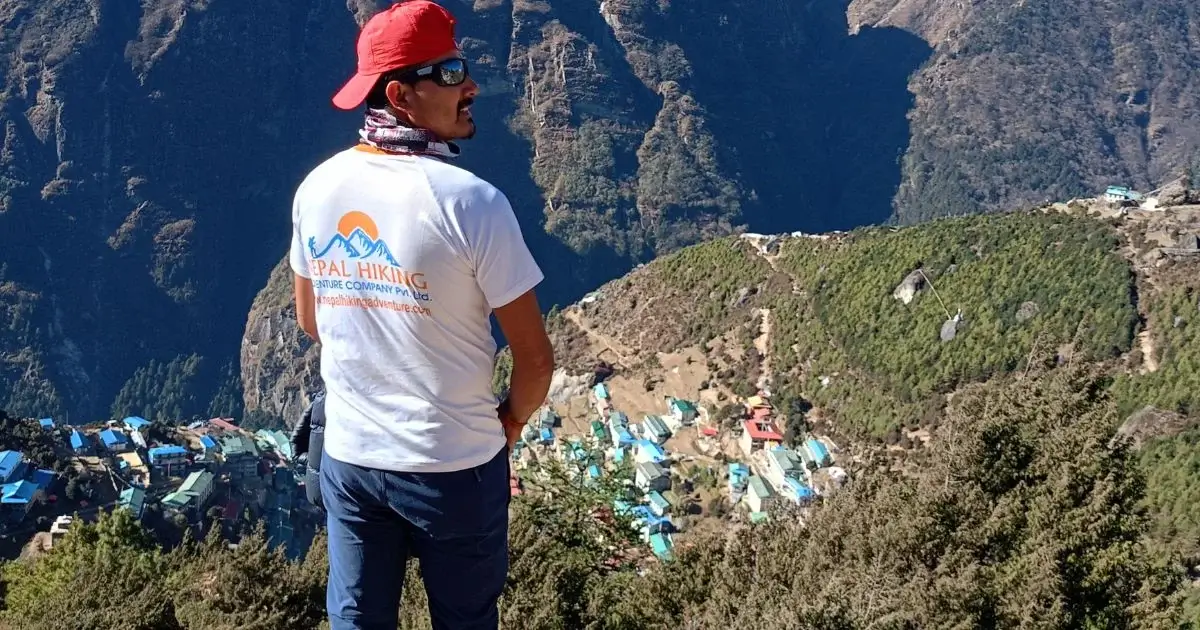
Everest Base Camp Trek Cost and Variations
The Everest Base Camp trek cost varies depending on services, route length, and group size. On average, the cost for a standard itinerary is around USD 1,200–1,800, covering guides, meals, accommodation, and permits for the Everest Base trek. Extended days or luxury upgrades can increase the total. The cost will also depend on the season and whether you choose to add side trips or extra acclimatisation days.
Important Notes
Permits: The Sagarmatha National Park permit and a local entry pass are required for the EBC trek.
Seasonality: The base camp trek is open most of the year, but spring and autumn offer the best views.
Itinerary Changes: The trek typically includes 2–3 acclimatisation stops, but this can be tailored.
Preparation: Your guide will provide details about the trek, ensuring safety and comfort for the entire duration.
Comparing EBC with Other Popular Treks
EBC is one of the world’s most iconic treks, but understanding how its costs compare to other Himalayan adventures helps inform your choices.
Comparison Insights
EBC’s higher cost compared to Annapurna ($2,000 average) stems from flight dependency and elevated porter wages.
Luxury EBC treks ($8,000 average) surpass Annapurna Base Camp ($5,000) due to dramatic high-altitude scenery and prestige.
Final Investment Analysis: Is EBC Trek Worth the Cost?
The Everest Base Camp trek represents a significant financial investment, but understanding the complete value proposition helps justify the expense for most adventurous travellers seeking to complete the EBC.
Cost Per Day Breakdown
Service Level | Total Cost | Daily Value |
Budget Trek | $1,800 | $150/day |
Standard Trek | $3,500 | $292/day |
Luxury Trek | $8,000 | $667/day |
Long-Term Value Considerations
Personal Development Returns
Confidence building through conquering the EBC
Physical fitness motivation and lifestyle changes
Cultural understanding and global perspective
Network building with fellow adventurers
Educational Investment Value
Immersion in Sherpa culture and Buddhist traditions
Environmental awareness and conservation understanding
High-altitude physiology and outdoor skills
Geographic and geological education of Everest and the surrounding peaks
Supporting Local Communities
Furthermore, your investment directly supports Sherpa communities, conservation efforts, and sustainable tourism. For instance, in 2022, one of our groups funded school supplies for a Khumjung primary school, lasting an entire year. Additionally, we hire local guides and porters, use family-owned tea houses, and work with eco-conscious suppliers.
Planning Your Everest Base Camp Investment
Your EBC trek is more than a journey into the Himalayas. Specifically, it is an investment in personal growth, cultural connection, and experiences that will remain with you for a lifetime. Thus, understanding the Everest Base Camp trek cost helps you plan wisely, whether you choose a more economical package or a premium service. Consequently, no matter your budget, the sense of achievement upon reaching base camp remains equally unforgettable.
Moreover, with careful planning, realistic budgeting, and the right level of service, you can focus entirely on the adventure rather than the logistics. For example, Nepal Everest Base Camp Co., with over a decade of expertise guiding treks since 2008, takes care of permits, flights, accommodations, and safety support, ensuring your journey is seamless from start to finish. In addition, our experienced local guides, trained in Wilderness First Aid, and well-organised itineraries mean you can fully immerse yourself in the beauty and culture of the Khumbu region.
Now is the ideal time to plan your trek, as the best spring and autumn departures fill quickly. Therefore, take the first step toward your Himalayan adventure by contacting Nepal Everest Base Camp Co. today at +977 9801087391 or [email protected]. The base camp trek is open, and the world’s most iconic base camp is waiting—will you answer the call?
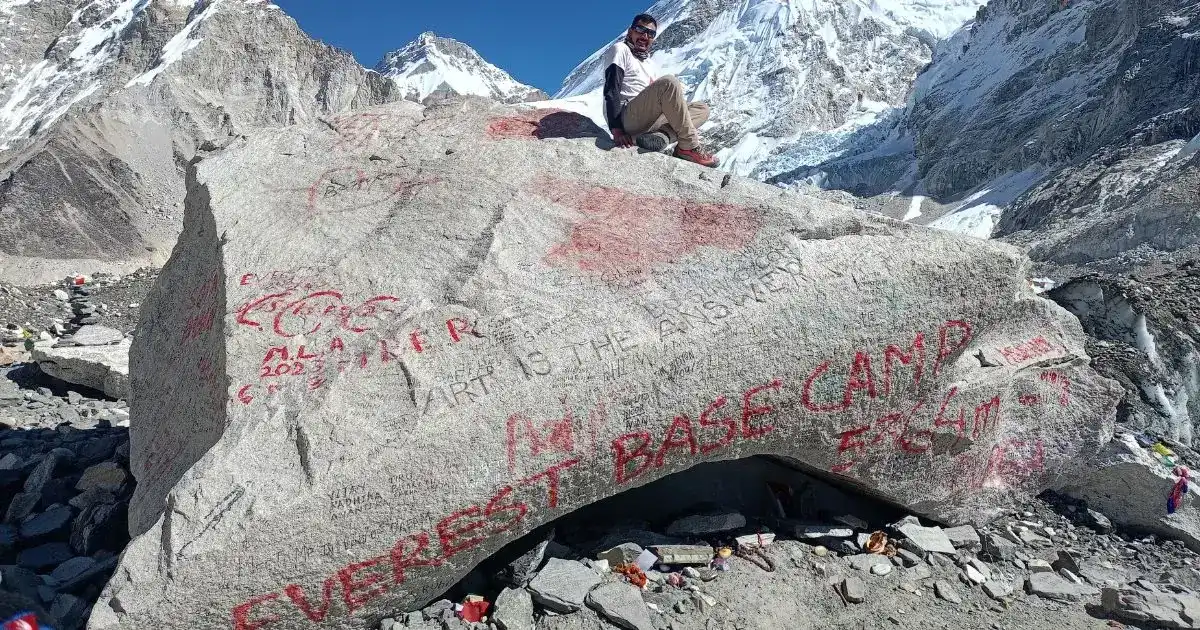
FAQs About Everest Base Camp Trek Costs
How much does the EBC trek actually cost?
The total cost ranges from $1,400 for budget treks to over $12,000 for luxury experiences, with most trekkers spending $2,800-4,200 for standard packages including flights, guides, accommodation, and meals.
What’s the most expensive part of the EBC trek?
International flights typically represent 30-40% of total costs, followed by guide/porter services and accommodation. Moreover, emergency helicopter evacuation ($8,000-15,000) represents the highest potential single expense.
Can I do the Everest Base Camp trek on a tight budget?
Yes, budget trekking is possible with costs around $1,400-2,200 but requires accepting basic accommodation, simple meals, shared facilities, and minimal safety margins. For instance, prior trekking experience is essential to trek without issues, as seen with clients who regretted choosing untrained guides.
Do I need special permits for EBC?
Yes, all trekkers need a Sagarmatha National Park Permit ($30), Khumbu Pasang Lhamu Rural Municipality Permit ($20), and TIMS Card ($20) - total $70 in permits for the Everest base.
How much should I budget for food during the trek?
Food costs range from $25-40 daily at lower elevations to $35-55 daily at higher altitudes. Thus, budget $400-700 total for meals depending on your choices and appetite.
Is travel insurance really necessary for EBC trek?
Absolutely essential. Specifically, high-altitude coverage costs $80-200 but provides crucial protection against helicopter evacuation expenses ($8,000-15,000) and medical treatment costs.
What’s available at EBC?
The base camp trek is open to trekkers year-round (except during monsoon), offering basic teahouse accommodations, limited food options, and access to stunning views of Mount Everest and surrounding peaks.
What does Everest Base Camp mean for trekkers?
EBC means a transformative journey combining physical challenge, cultural immersion, and unparalleled natural beauty, making it one of the world’s most iconic treks.
